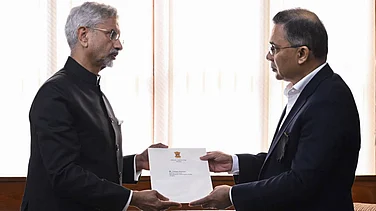Following a suicide bombing last week in Karachi that killed three Chinese natioanls, Pakistan's Prime Minister Shehbaz Sharif has decided to hold a complete review of security arrangements for Chineses nationals working in the country, as per a media report.
The Express Tribune newspaper reported that Sharif's government would assess all mechanisms in place for ensuring the security of Chinese nationals. New plans are also being made by planning and interior ministries which would be presented to Sharif in the first week after Eid.
There are thousands of Chinese nationals in Pakistan engaged in the $62 billion Chinese Pakistan Economic Corridor. The government's review has come in the view of potential threats to CPEC and other joint ventures between the two countries.
Last week, a burka-clad woman blew herself inside the University of Karachi's Confucius Institute, which killed three Chinese national and their Pakistani driver. China asked Pakistan after the attack to scale-up security for its nationals working in the country and demanded a thorough investigation and punishment to the perpetrators.
The newspaper report said Sharif had also directed Planning, Development and Special Initiatives Minister Ahsan Iqbal to meet the country heads of all the Chinese companies working in Pakistan to seek their input in security and other arrangements. The sources said the planning minister was scheduled to visit Gwadar soon after Eid to examine the security arrangements and complaints, if any, by the Chinese companies and nationals working on CPEC projects.
Sharif has also directed the interior ministry to engage provinces, especially the Balochistan government, for the provision of security in Gwadar and submit a report in the first week after Eid.
Apart from security arrangements, the ministries have been asked to examine the challenges confronted by CPEC projects and see what problems were the Chinese nationals facing for the last four years in connection with their work, visa issuance as well as extension among other matters.
The Gilgit-Baltistan government has also directed the officials concerned to make foolproof security arrangements for Chinese nationals in the wake of the recent and earlier attacks on them.
“I am directed to refer (to) the recent suicide attack in Karachi that killed three Chinese nationals and to say that the Chief Secretary has desired to ensure special protection of Chinese nationals in Gilgit-Baltistan,” a letter issued by the G-B additional secretary read.
Keeping the potential threats to CPEC and other joint ventures, the letter added, the existing standard operating procedures (SOPs) were required to be reviewed and updated to ensure foolproof security of Chinese nationals working in the geographic limits of Gilgit Baltistan.
The letter said, “The home department shall establish a provincial foreigners security cell, with requisite staff and logistics, to coordinate security SOPs and access to information of all Chinese nationals visiting Gilgit-Baltistan.”
The letter further stated that the cell should regularly liaison with regional and federal law-enforcement agencies.
The Gilgit-Baltistan government has directed the commissioners and senior police officers to personally visit the Chinese camps and facilities for inspection of security apparatus.
Last week's attack is seen as the latest in the line of attacks on Chinese personnel in Pakistan. In July 2021, nine Chinese nationals were among 12 people killed in a bus explosion near a CPEC hydropower plant in Khyber Pakhtunkhwa province. The Chinese consulate in Karachi was attacked in November 2018. In 2017, two Chinese natioanls were abducted and executed.
(With PTI inputs)


























